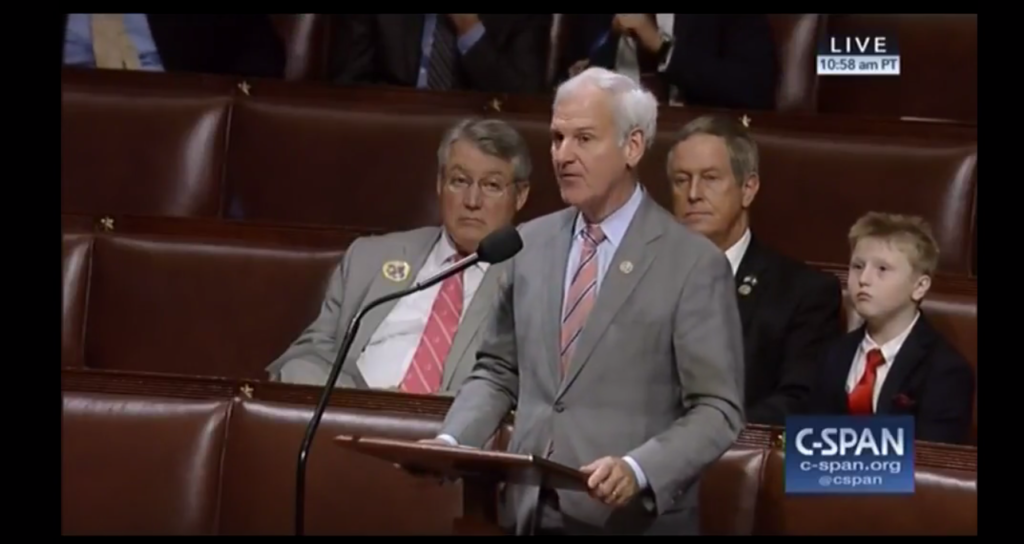Congress passes legislation to lessen burdensome occupational licensing

In late July, Congress passed the Strengthening Career and Technical Education for the 21st Century Act aimed at helping states begin long overdue occupational licensing reforms. As describes in an article by the Washington Examiner, the bill includes the New HOPE Act, “which allows governors to use existing federal funds for technical education to review licenses or certifications that pose an unwarranted barrier to entry into the workforce and do not protect the health, safety, or welfare of consumers.” Alabama 1st District U.S. Rep. Bradley Byrne was a co-sponsor of the bill and instrumental in its passing. In a floor speech Byrne told his fellow representatives, “we have a skills crisis in our country. We actually have more job openings than we have unemployed Americans. This is keeping our economy from reaching full potential. “So how we do solve this problem? Well, a big way is through expanding career and technical education programs. As the demands of the workforce continue to change and become more complex, these programs are critical to building the workforce of the 21st Century,” Byrne continued. The original purpose of these licenses was to protect consumers from those who would offer them a bad or unsafe product or service; but over time license requirements became more extensive, costly, and now cover a numerous amount of vocations. The Alabama Policy Institute (API) released a report in January detailing how detrimental, and costly occupational licensure is to Alabama. According to the report, ”Alabama licenses a total of 151 occupations, covering over 432,000 Alabama workers, which represents over 21 percent of the state’s labor force.” “We estimate the total initial costs of occupational licensure, excluding the educational costs, to be $122 million. Annual license renewal costs both workers and consumers (who often pay for these costs in increased prices) $45 million total,” the report continued. “This bill won’t get nearly the attention it deserves, but this is a huge, bipartisan victory for students, businesses of all sizes, and the American people,” Byrne said in a press release. “By improving our nation’s career and technical education programs, we can better meet the demands and realities of the 21st Century economy and put more Americans to work.”
Martha Roby: Meeting the demands of our growing workforce

Last month’s jobs report showed that job openings are at a record high, confirming our country’s continued positive economic progress. For the first time since the year 2000, the number of job openings is larger than the number of people unemployed. Our country’s gross domestic product also grew at a 4.1 percent pace in the second quarter of this year, marking the fastest rate of growth since 2014. This is great news for the American people, and our focus moving forward must be to continue this momentum. As I have said many times before, over the last year and a half, our unified Republican government has worked very hard to deliver meaningful results on the economic front. I am proud of our efforts to foster economic growth and opportunity, and I believe it is critical that we provide a well-trained workforce to meet the demands. That’s why I am glad to report that Congress has officially sent the Strengthening Career and Technical Education for the 21st Century Act, an important workforce development bill, to the President’s desk for his signature. This important piece of legislation reauthorizes the Perkins funding that supports career tech programs at the state and local levels. The bill also makes needed improvements to the system to ensure these crucial dollars are spent effectively and efficiently. In addition, this legislation updates the federal investment in career tech education to provide increased flexibility to states to ensure these CTE programs are high quality, engaging, and above all, successful. As you know, our state is fortunate to have a very strong network of community colleges that offer a wide variety of career training. Alabama’s Community College System has more than 79,000 students enrolled in career tech programs, and more than 70 public high schools in our state offer CTE courses. They are working in lockstep with industries to ensure the educational training matches the jobs that will be waiting for these students when they complete their coursework. Our district is home to quite a few excellent career tech programs, including those at Trenholm State Community College in Montgomery, Wallace Community College in Dothan and their Sparks Campus in Eufaula, the Enterprise State Community College campuses in Enterprise and Ozark, Ingram State Technical College in Deatsville, Reid State Technical College in Evergreen, and the Lurleen B. Wallace Community College campuses in Andalusia, Opp, and Greenville. To broaden this extensive network even more, many high schools enjoy partnerships with nearby community colleges to offer students courses closer to home. Over the years, I have had the opportunity to visit many of these campuses and see firsthand the quality training they offer. Most recently, I stopped by Lurleen B. Wallace’s MacArthur Campus in Opp for a tour, and I was truly blown away by the wide variety of courses available. There’s no question that in Alabama, our current CTE system is working well, but that shouldn’t stop us from making every effort to improve it. The Strengthening Career and Technical Education Act for the 21st Century, which I hope will soon be signed into law, provides proper investment in quality career tech programs – but this is about so much more than just funding. This important bill provides greater flexibility to states and program administrators on the ground so they are able to adjust to ever-changing needs. The bill also improves accountability to require CTE programs to deliver results. Career tech programs are so important because they meet the demands of our steadily changing workforce by equipping students with the skills, knowledge, and experience they need to be competitive and fill these roles. Rest assured as your Representative in Congress, I will always support measures to improve and strengthen the CTE programs throughout our state and nation. And as always, I am hopeful that we will continue to see increased numbers of job openings and opportunities for all Alabamians and all Americans. ••• Martha Roby represents Alabama’s Second Congressional District. She lives in Montgomery, Alabama, with her husband Riley and their two children.
Bradley Byrne: Who will build our 355 ship Navy?

America has the most powerful Navy the world has ever seen. For centuries, our sailors have provided peace and stability around the globe. With over eighty percent of the world’s population living within sixty miles of the sea and ninety percent of world trade moving by sea, a strong and capable U.S. Navy is critical to a bountiful economy and the wellbeing of humanity. Unfortunately, due to defense cuts and a shrinking fleet size, competitors are challenging our naval superiority. This is why it is critically important we support the Navy’s proposed 355 ship fleet and continue to invest in the latest technology. In order to grow our Navy and make sure we continue to be an example of strength for the rest of the world, it is vital that we have a robust shipbuilding industry here at home. Shipbuilding and ship repair have been an important part of our national economy since our country’s founding. Nationally, the industry accounts for roughly 400,000 jobs, provides $25.1 billion in labor income, and contributes over $37.3 billion to the GDP. Shipbuilding is about both national security and a strong economy. Unfortunately, we cannot build up to the 355 ship fleet of tomorrow without a skilled and capable workforce. Our nation continues to experience a severe gap in skilled workers, and the shipbuilding industry is not immune to this problem. This is one example why career and technical education (CTE) programs are so important. They provide American workers with the development and training needed to build the ships that are necessary in order to maintain our naval superiority. Thousands of workers in the United States look to technical education programs as a path forward in their careers. Whether it is a sudden and unexpected career change or a well-planned out career for a high school student, CTE programs offer opportunity and growth for a wide range of Americans. Aaron, one of my constituents in Southwest Alabama, is a great example of a CTE success story. Ten years ago, he started out as a plumber, but after going through a CTE program, he now supervises pipe and machinery for an entire shipyard in coastal Alabama. His supervisor cites him as one of their best leaders. His life was forever changed thanks to CTE, and he is now helping build our nation’s warships. As the former chancellor of the Alabama’s community college system, I have seen these CTE programs firsthand and they work like magic. Encouraging our nation’s workforce to specialize in a valuable trade like shipbuilding and repair improves their lives and also provides tremendous benefits to both our economy and our national security. Earlier this year, the House passed H.R. 2353, the Strengthening Career and Technical Education for the 21st Century Act, on a huge bipartisan vote. Our bipartisan bill updates the Carl D. Perkins Career and Technical Education Act by empowering state and local leaders, improving alignment with in-demand job areas, and increasing transparency and accountability. These reforms will make our CTE programs stronger, which in turn will benefit the overall U.S. economy. The bill is now under consideration in the Senate, and I hope they will act swiftly on this bipartisan bill to help train the workforce of tomorrow, including our nation’s shipbuilders. As President Theodore Roosevelt said in 1902, “A good Navy is not a provocation to war. It is the surest guaranty of peace.” As we work to build up our Navy, let us not lose sight of the importance of maintaining and supporting a skilled workforce to build the 355 ship fleet of tomorrow. • • • Bradley Byrne is a member of U.S. Congress representing Alabama’s 1st Congressional District.
Martha Roby: Connecting today’s students with tomorrow’s careers

The June jobs report was released Friday, and it shows some positive economic progress. Wages are up and the economy added 222,000 jobs, far exceeding expectations for June. The national unemployment rate ticked up by a tenth to 4.4 percent, but economists say that’s actually healthy because it was caused by more Americans joining the workforce. Alabama’s unemployment rate sits at 4.9 percent, which is its lowest level in nine years. All this is welcome news, and our focus going forward must be continuing the positive momentum. The House of Representatives has recently taken several measures to foster economic growth and opportunity, and I am particularly proud of our work to strengthen career and technical education to support our workforce. I’m a big believer in career tech programs for three simple reasons: They help prepare students for rewarding careers; they ensure American workers have the necessary training for skilled trades that are foundational to our society; and they boost local economies by producing a quality workforce. For more than 30 years, federal funding known as Perkins funding has helped support career tech programs at the state and local level. Recently, the House passed H.R. 2353, the Strengthening Career and Technical Education for the 21st Century Act, to reauthorize this funding and make needed improvements to ensure Perkins dollars are spent efficiently and effectively. When it comes to higher education, there has been a silent stigma attached to not completing an academic degree at a four-year university. For too long society refused to acknowledge that college really isn’t for everyone and that a solid career tech education can actually lead many Americans to a better quality of life. Thankfully, I believe those days are over. Efforts like Mike Rowe’s “Go Build America” campaign have been successful in raising awareness and dispelling myths about the jobs that exist in skilled trades. Law enforcement, automotive technology, welding, carpentry, machine technology, transportation and logistics, health science, and information technology are just some of the high-demand career fields students can pursue through a career tech program. Our state is fortunate to have a strong network of community colleges offering a wide variety of career training. Alabama’s Community College System has more than 79,000 students enrolled in career tech programs, and more than 70 Alabama public high schools offer CTE courses. They are working hand-in-glove with industries to make sure the training matches the jobs that will be waiting for students when they complete their courses. Alabama’s 2nd District is home to thriving career tech programs at places like Trenholm State Community College in Montgomery, Wallace Community College in Dothan and their Sparks Campus in Eufaula, Enterprise State Community College campuses in Enterprise and Ozark, Ingram State Technical College in Deatsville, Reid State Technical College in Evergreen, and Lurleen B. Wallace Community College campuses in Andalusia, Opp, and Greenville. Many high schools are now partnering with nearby community colleges to offer students courses closer to home. I’ve had the privilege of visiting many of these campuses and seeing firsthand the quality training being offered. As encouraged as I am about our current system, I see so much more potential for students and local communities through proper investment in quality career tech programs. The Strengthening Career and Technical Education for the 21st Century Act provides that with more than $5.9 billion over the next five years. However, the bill is so much more than just funding. The bill also simplifies the application process for grants, provides greater flexibility to program administrators so they can adjust to changing needs, improves accountability to require that career tech programs deliver results, and ensures a proper limited federal role in education. Career tech programs connect today’s students with tomorrow’s careers by equipping them with the skills, knowledge, and experience they need to be competitive in the workforce. I will continue to do all I can to support these efforts as your Representative in Congress. ••• Martha Roby represents Alabama’s Second Congressional District. She lives in Montgomery, Alabama with her husband Riley and their two children.
Bradley Byrne: Putting Americans back to work

You have probably read the stories about how Republicans and Democrats can never get along and how it has caused absolutely nothing to get done in Washington. While that may make a good narrative for the media, it is not accurate. In fact, just this past week, Congress came together in a bipartisan way to pass bills that will help put the American people back to work. I was especially proud of our bipartisan efforts to boost our nation’s career and technical education (CTE) programs. These programs are critical in helping connect Americans with the skills they need to find a good-paying job. There is a false belief in our country that in order to be successful you have to obtain a four year degree or more. That simply is not true. In fact, many Americans have successful lives after attending a community college or gaining a certificate from a training program. That is what career and technical education is all about. Back when I served as chancellor of Alabama’s two year college system, I saw these programs work firsthand. I saw individuals who had absolutely no background or prior training go through a welding program and end up with a great job that pays high wages. These programs truly work like magic. CTE programs are so important in today’s economy because our country is experiencing a skills gap. This means there are jobs out there that remain unfilled because people lack the skills required to fill the jobs. This is limiting economic growth and hurting the overall economy. Well, CTE programs can help close that skills gap by giving people the training they need. Our bipartisan bill, the Strengthening Career and Technical Education (CTE) for the 21st Century Act, makes important reforms to ensure our CTE programs are actually working and directs resources toward in-demand skill areas. Importantly, the bill ensures a limited role for the federal government while empowering state and local leaders. Ultimately, improving career and technical education programs is the most important thing Congress can do to help close the skills gap, combat poverty, and help put Americans back to work. On another bipartisan note, the House also passed a bill last week to help people on welfare programs have access to jobs. The bill would establish a test program for states to create a targeted tax credit for employers who hire individuals on welfare programs. The bill, the Accelerating Individuals into the Workforce Act, passed on a strong bipartisan vote of 377 to 34, and it makes progress on the important priority of encouraging work among welfare recipients. As we continue our efforts to fight poverty, we must measure success by how many people we are getting off of welfare programs and back to work, not by how many people we are adding to the welfare rolls. Through improving career and technical education and encouraging work in welfare, there will be three big wins for the American people. First, we will help individuals live more successful lives by connecting them with jobs. Second, we will grow the overall American economy by closing the skills gap. Third, we will save taxpayers money by taking people off welfare and putting them to work. So, while there are certainly issues where Republicans and Democrats do not agree, there are a large number of areas where we often come together and make a difference on behalf the American people. That is exactly what we did this past week with our efforts to create more opportunities for the American people through boosting career and technical education and promoting work in our nation’s welfare programs. • • • Bradley Byrne is a member of U.S. Congress representing Alabama’s 1st Congressional District.
Byrne, Roby celebrate House passage of bill to overhaul career-tech education

Americans face a job market vastly different from the one that existed a generation ago. With constant advances in technology and an ever-growing global economy, the kinds of jobs available require high-quality education and skills development vital to competing in today’s workplaces. Since 1984, the Carl D. Perkins Career and Technical Education Act has endeavored to provide federal support to state and local career and technical education, or CTE, programs. But the law has not been updated in more than a decade, and no longer reflects the realities and challenges facing students and workers. Which is why the House of on Thursday approved a bill update the law and help all Americans access the education they need to earn a lifetime of success. H.R. 2353, the Strengthening Career and Technical Education (CTE) for the 21st Century Act, passed on a voice vote, reauthorizes and updates the Carl D. Perkins Career and Technical Education Act and includes some important reforms: Empowers state and local community leaders; Improves alignment with in-demand jobs; Increases transparency and accountability to ensure programs deliver results; Simplifies the application process Provides greater flexibility to program administrators so they can adjust to changing needs; Ensures a limited federal role in education. Alabama 1st District U.S. Rep. Bradley Byrne, Chairman of the House Workforce Protections Subcommittee, today celebrated the passage of the bill saying it will have a “huge impact at creating opportunities for Americans in Southwest Alabama and around the country.” “Improving career and technical education programs is the most important thing Congress can do to help close the skills gap, combat poverty, and put Americans back to work,” said Byrne. “I’ve seen these programs firsthand dating back to my time as Chancellor of Alabama’s two-year college system, and they truly work like magic. “This is the type of bipartisan bill that will never get the attention it deserves, but it will have a huge impact at creating opportunities for Americans in Southwest Alabama and around the country.” His Alabama House colleague, 2nd District U.S. Rep. Martha Roby echoed his sentiments. “I’m a big believer in Career Tech programs for three simple reasons: They help prepare students for rewarding careers; They ensure American workers have the tools necessary for skilled trades that are foundational to our society; And, they boost our economy by providing a quality workforce,” said Roby ahead of the vote. “With the modern workplace changing at a rapid pace, it is imperative that educators and facilities keep up. With this bill, these programs can continue to successfully connect today’s students with the careers of tomorrow.” Byrne delivered a speech on the House floor in support of the bipartisan legislation. Watch below: A transcript of Byrne’s remarks can be found below: I thank the Chairwoman for yielding, and I am proud to rise in support of this strong, bipartisan legislation. Improving career and technical education programs is the most important thing Congress can do to help close the skills gap, combat poverty, and help put Americans back to work. Studies clearly show that there are unfilled, high wage jobs out there that remain open because people lack the skills to fill the jobs. That’s where CTE comes in. When I was Chancellor of Alabama’s two-year college system, I saw firsthand just how impressive these programs are. They really do work like magic by taking an untrained worker and giving them the skills they need to fill an in-demand job. It is a win-win situation for everyone. So, Mr. Speaker, I am proud to be an original co-sponsor and supporter of this legislation, I encourage my colleagues to join me in supporting this reform-oriented bill that helps build the 21st Century workforce. Watch Roby’s floor speech below:
Bradley Byrne votes to boost career and technical education

Alabama 1st District U.S. Congressman Bradley Byrne, a member of the House Education and the Workforce Committee, on Tuesday voted in favor of legislation to boost and reform America’s career and technical education (CTE) programs. The U.S. House of Representatives passed H.R. 5587 — the Strengthening Career and Technical Education for the 21st Century Act — which limits the federal government’s role and empowers states and local community leaders by giving them greater flexibility over how they use federal funds for career and technical education. As an original co-sponsor, Byrne helped write and introduce the legislation, which passed by a vote of 405 to 5 with the support of the entire Alabama delegation, excluding Rep. Terri Sewell, who did not vote. During debate on the bill, Byrne spoke on the House floor about the importance of career and technical education, and he also highlighted important CTE programs in Southwest Alabama. “You see, for too long, we have devalued the importance of career and technical education here in America,” said Byrne on the House floor. “The programs were seen as some sort of second-rate option for students who couldn’t make it otherwise.” “That simply isn’t the case,” Byrne continued, “Instead, CTE programs offer real opportunities to students of all ages and from all backgrounds. And, with this bill, we are making it clear that career and technical education is a critical educational option that leads to good-paying jobs.” Among the many reforms included in the bill, H.R. 5587 would: Empower state and local community leaders; Improve alignment with in-demand jobs; Increase transparency and accountability; and Ensure a limited federal role. The legislation is supported by a range of organizations including the U.S. Chamber of Commerce, the Alabama Association of School Boards, the School Superintendents Association, the National Association of Manufacturers and the American Farm Bureau Federation.
Bradley Byrne: We must work together to solve our nation’s problems

Is it really as bad as it seems? That is a question I get all the time. People want to know if the partisanship and gridlock in Washington is actually like what they see on television. The short answer is no. The reality is Republicans and Democrats often work together on bipartisan legislation to address serious issues, but it just doesn’t always make the front page of the newspaper or the evening news because it isn’t “exciting” enough. It is an election year, and I know partisan politics are what take up most of the attention. But in Washington, bipartisan work is underway to address some important issues that have the potential to make a real difference for American families. For example, just this past week the House passed a significant overhaul of our nation’s mental health programs. My family has been personally impacted by mental illness as my grandfather was shot and killed by a mentally ill man, so this issue is personal to me. For too long we have failed to actually treat those who suffer from mental illness. Our bill makes clear that mental illness is not a crime but rather a true health issue that should be treated as such. Addressing the mental health crisis will also help fight these terrible mass violence events that have struck our country in recent years. Many of the people who committed the crimes suffered from mental illness. Instead of pushing new gun laws, we should be focusing on the root cause of these acts, like mental health reform. This is an issue that unites Republicans and Democrats, and I am pleased to report our mental health bill passed by a vote of 422 to 2. Another great example of the bipartisan work being done in Congress is a bill to strengthen career and technical education programs. As former chancellor of Alabama’s two-year college system, I have seen firsthand the amazing work done through career and technical education. These programs help connect people with the skills they need in order to meet workforce demands. Our reform bill gives states more flexibility to use federal resources while also ensuring that we focus on employability skills and work-based learning opportunities. Just as important, our legislation gives parents, students, and stakeholders a voice in setting performance goals and evaluating the effectiveness of the programs. I was pleased to support the Strengthening Career and Technical Education for the 21st Century Act when it passed the Education and the Workforce Committee by a vote of 37 to 0. The House also passed a bill last week by a vote of 407 to 6 to address the opioid prescription drug crisis. The opioid crisis has impacted families from every corner of the United States, and our legislation will help ensure people have access to treatment they desperately need. These are just three examples of bipartisan work being done in Congress to address actual challenges facing our country. I think this good news is especially important given the tragic events that recently impacted our country. During times of tragedy, it is easy to become angry and allow the issues to drive us further apart, but we cannot fall victim to that temptation. Instead, the answer is love for one another and compassion even for those with whom we may not always agree. Most importantly, the key is to focus on the things that unite us. That is exactly what happened in the People’s House this past week, and I will continue looking for opportunities to support bills that unite us, instead of drive us further apart. • • • Bradley Byrne is a member of U.S. Congress representing Alabama’s 1st Congressional District.


